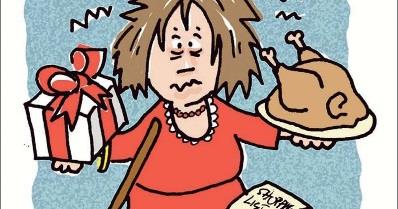
The holiday season often presents a dizzying array of demands- traveling, shopping, baking, cleaning, and entertaining, to name a few. According to a survey by the American Psychological Association, 38 percent of people said their stress level increases during the holidays. Another survey, by the investment firm Principal Financial Group, revealed that 53 percent of people feel financially stressed by holiday spending, although more than half of the 1,000 respondents had created spending budgets.
It’s important to note that, despite the widely held belief that suicides peak during the holidays, the evidence strongly suggests that is not the case. According to the National Center for Health Statistics, part of the Centers for Disease Control and Prevention, the suicide rate actually peaks between April and August, while the winter months – November, December and January – see the lowest daily suicide rates. But suicide rates aren’t the only way to measure unhappiness… the holiday blues are real. Though they haven’t been studied to any great extent, holiday stress and depression can strike anyone. With some practical tips, you can minimize the stress that accompanies the holidays. You may even end up enjoying the holidays more than you thought you would.
- Acknowledge your feelings. If someone close to you has recently passed or you are not able to be with loved ones, realize that it’s normal to feel sadness and grief. It’s OK to take time to cry or express your feelings. You can’t force yourself to be happy just because it’s the holiday season.
- Reach out. If you feel lonely or isolated, seek out community, religious or other social events. They can offer support and companionship. Volunteering your time to help others also is a good way to lift your spirits and extend your friendships.
- Be realistic. The holidays don’t have to be perfect. As families change and grow, traditions and rituals often change as well. Choose a few to hold on to and be open to creating new ones. For example, if your adult children can’t come to your house, find new ways to celebrate together, such as sharing pictures, emails or videos.
- Stick to a budget. Before you go gift and food shopping, decide how much money you can afford to spend, then stick to your budget. Don’t try to buy happiness with an avalanche of gifts.
- Learn to say no. Saying yes when you should say no can leave you feeling resentful and overwhelmed. Friends and colleagues will understand if you can’t participate in every project or activity. If it’s not possible to say no, try to remove something else from your agenda to make up for the lost time.
- Don’t abandon healthy habits. Don’t let the holidays become a free-for-all. Overindulgence only adds to your stress and guilt.
- Take a breather. Make some time for yourself. Spending just 15 minutes alone, without distractions, may refresh you enough to handle everything you need to do. Find something that reduces stress by clearing your mind, slowing your breathing, and restoring inner calm.
As important as noting your stressors, you should also consider what brings you happiness and try hard to maximize those moments during the holidays. Whether it’s baking cookies, singing carols, or volunteering, be sure to maintain your own self-care.
As this joyous (and stressful) time grows near, it may be helpful to enter the season with a preset goal or intention. “For this holiday season, my intention is to notice one thing I’m grateful for every day, or to put time and energy into connections who are the most important to me, or to use the time to recuperate from a long year.” Try not to get caught up in all the endless to-do’s and stressors. Go into it with an idea of what you want to get out of it.
